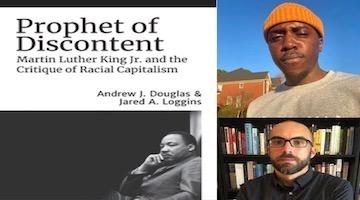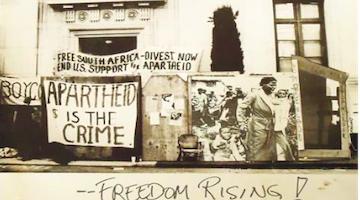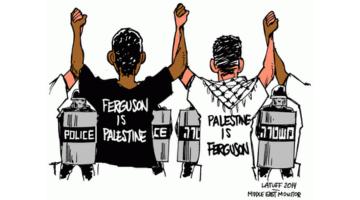Related Stories
Keeanga-Yamahia Taylor
Historian Elizabeth Hinton’s book reveals that, in the late sixties and early seventies, there were hundreds of local rebellions against white viol
joshua briond
The response to Black rebellion are all distinct types of “reforms” to politically sedate Black surplus populations and sustain white settler-capit
Roberto Sirvent, BAR Book Forum Editor
Jazzman William Parker’s work is a bold art of resistance to capitalism, colonialism, racism, and the runaway train that is our present-day America
Joy James
Joy James uses poet Lucille Clifton's image of “new bones” to reflect on a series of revolutionary anniversaries in 2021 and the nature of pol
Roberto Sirvent, BAR Book Forum Editor
The authors set out to reconstruct King’s critical theory of racial capitalism.
George Yancy
White supremacist culture is a permanent site of predatory consumption, extraction and violation.
Editors, The Black Agenda Review
By what stretch of the imagination can the US be a democracy when ordinary citizens have virtually no influence over what their government does?&…
Charisse Burden-Stelly, PhD
The celebration of Isabel Wilkerson’s Caste reflects the continued priority of elite preferences over the needs and struggles of
Gustavus Griffin
A significant portion of sports franchise wealth can be traced directly to the oppression and displacement of Black and Brown bodies.
Editors, The Black Agenda Review
The phrase racial capitalism first emerged in the context of the anti-Apartheid and southern African liberation struggles in the 1970s.
More Stories
- Jon JeterIsrael's brutal treatment of Black solidarity activists proves the truth that resistance to settler colonialism comes with a price. For Black Americans standing with Palestine, that price has always…
- Raymond Nat Turner, BAR poet-in-residence"For a young labor leader leading by example" is the latest from BAR's Poet-in-Residence.
- Black Alliance For PeaceWashington, D.C.'s political subjugation exposes America's democratic facade. While claiming to champion self-rule globally, the U.S. increases repression and lays siege on the residents of its own…
- Matteo CapassoFukuyama's 'end of history' was just an excuse for empire that Wang Huning saw through back in 1991. Now, as America's broken system tears itself apart, our job isn't to save it, but to build…
- Charisse Burden-Stelly, PhDAs the Trump administration escalates its anti-radical crackdowns, past moments of repression offer a preview of what’s to come.



















